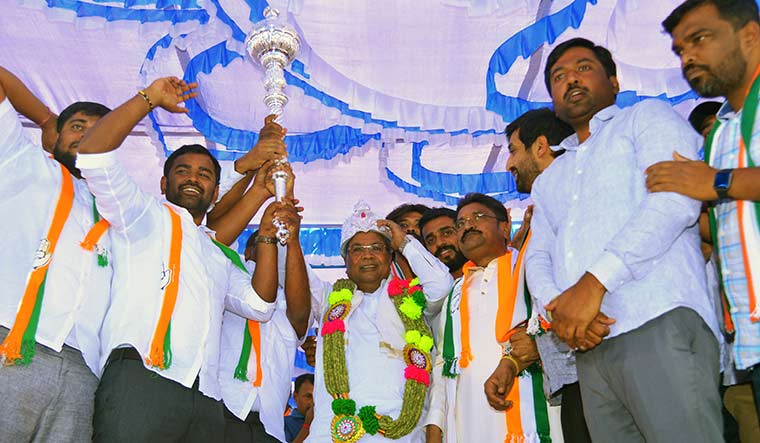A CIVIL COURT in Bengaluru passed a restraining order on January 9, staying the publishing, sale and display of the book, Siddu Nija Kanasugalu (Siddu’s real dreams), which is said to be critical of former chief minister Siddaramaiah. The order came just a few minutes before the book’s official launch by Higher Education Minister C.N. Ashwath Narayan, after the court took up a petition filed by Siddaramaiah’s son and Varuna MLA Yathindra who had alleged the book had “defamatory” content. The title of the book is similar to another controversial book, Tippu Nija Kanasugalu, by Addanda C. Cariappa and it is suspected that it targets Siddaramaiah’s brand of ‘Ahinda’ politics which relies on minorities, dalits and OBCs.
Siddaramaiah has reasons to worry as he has constantly been the target of both the BJP and the Janata Dal (Secular). After his ouster from the JD(S) in 2005, Siddaramaiah’s growing animosity with JD(S) patriarch and former prime minister H.D. Deve Gowda cost him dearly. It antagonised the Vokkaliga community that dominates the Old Mysuru region. Siddaramaiah’s defeat in the Chamundeshwari assembly constituency in 2018, his home turf where he had won five times in the past, was a fallout of his souring relations with Deve Gowda.
The Kuruba strongman continues to fight the ‘outsider’ tag within the Congress. His surprise elevation to the chief minister’s post in 2013, bypassing veterans like Mallikarjun Kharge, G. Parameshwara, K.H. Muniyappa and D.K. Shivakumar was resented by many. Parameshwara, who lost the Koratagere seat in 2013 and hence the top post, suspects Siddaramaiah’s hand behind his defeat. Muniyappa holds Siddaramaiah’s close aide and former speaker Ramesh Kumar responsible for his defeat in Kolar in the 2019 Lok Sabha polls. Shivakumar sympathisers recall how he was kept out of the cabinet by Siddaramaiah.
Fear of sabotage had forced Siddaramaiah to contest from two seats in 2018―Badami in Bagalkot and Chamundeshwari in Mysuru. He was defeated in Chamundeshwari apparently due to the mobilisation of Vokkaliga votes against him by the JD(S). He scraped through in Badami with a margin of 1,699 votes. The eight-time MLA is once again searching for a ‘safe seat’ which would give him time to campaign all over the state. A hung verdict is bound to scuttle his chances of becoming the chief minister as the JD(S) would end up being the kingmaker.
Siddaramaiah has not yet filed an application for a ticket before the Congress screening committee (which received 1,490 applications for 224 seats), apparently to closely study his options. While there is speculation that he could be pitched against B.Y. Vijayendra, state BJP vice president and son of Lingayat strongman and former chief minister B.S. Yediyurappa, in Varuna, Siddaramaiah is not keen on moving his son out either. In Badami, his re-election seems tough, given that former minister B.B. Chimmanakatti, a five-time MLA who gave up the seat for Siddaramaiah in 2018, has openly declared that he was “not welcome” this time.
On January 9, Siddaramaiah announced that he was keen to contest from Kolar, but added that his candidature was “subject to approval” from the high command. Kolar is certainly looking promising owing to the large presence of Muslim and Kuruba voters. Siddaramaiah is hoping to draw the support of the scheduled castes, scheduled tribes and the OBCs. Infighting and factionalism could, however, be a headache in Kolar as Muniyappa and Ramesh Kumar are at loggerheads. Siddaramaiah might also use his seniority to bargain for a second seat despite state Congress chief D.K. Shivakumar’s announcement that no leader would be allowed to contest from two seats.
Siddaramaiah’s popularity rankles the ruling BJP. Unlike Shivakumar, who is battling a slew of cases filed by the Enforcement Directorate and the CBI, Siddaramaiah has had a clean image and is popular among the Ahinda voters. The saffron party keeps on fiercely attacking Siddaramaiah, equating him to Tipu Sultan and labelling him “anti-Hindu” as part of its polarisation strategy to consolidate Hindu votes.
The BJP blames Siddaramaiah, a vocal critic of hindutva politics, for the growth of the Popular Front of India, a radical outfit banned by the Union government last year for its alleged terror links. Union Home Minister Amit Shah said when Siddaramaiah was in power, his government had withdrawn 1,700 cases filed against members of the PFI, a charge Siddaramaiah vehemently denies.
While, Shivakumar has consciously avoided being labelled as “anti-Hindu”, fearing backlash from the majority community, Siddaramaiah has never shied away from raking up sensitive issues like the anti-conversion bill, the hijab ban, the campaign against halal food, and the ban on Muslim traders in Hindu temple festivals. He has even criticised his own party’s reluctance to take a clear stand on communal issues. “The Congress has the responsibility to protect the minorities, the OBCs and others. We must be aggressive as it is not the politics of appeasement, but our commitment to protecting secularism in the Constitution,” said Siddaramaiah at a party meeting attended by Rahul Gandhi.
While many compare Siddaramaiah’s Ahinda experiment in social engineering with D. Devaraj Urs’ attempt to consolidate SC, ST and OBC voters by extending reservation benefits, his secular credentials are now being increasingly questioned. “As a former chief minister, Siddaramaiah should have been confident of winning from any seat if he has worked for all communities without any favouritism,” said BJP spokesperson Tejaswini Gowda. “Why is he hunting for a safe seat with a sizeable Muslim population now?”


